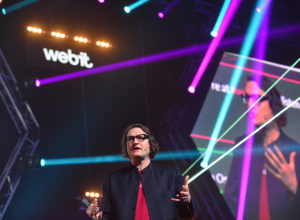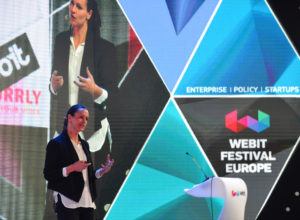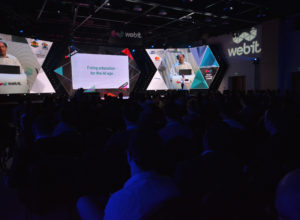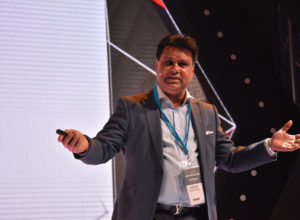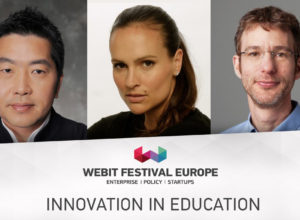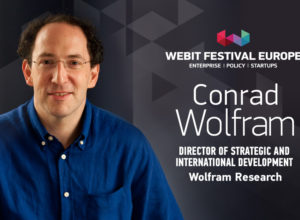Tag: Education
How to invest in people and build the foundations of future...
 In times of drastic social and economic changes, like the ones we live in, knowledge about the future can be a crucial factor for building it the right way. As Malcolm X once said - Education is our passport to the future, for tomorrow belongs to the people who prepare for it today!
The massive potential of technological advancements in the fields of Artificial Intelligence, Virtual Reality, Quantum Computing, Automation and Robotics should make us think how we need to educate our kids and develop their skill sets for the demand of the future.
The AI and Automation will surely make many manual, repetitive jobs obsolete. But as any tech advancements in the past, the ones that are before us will certainly create many occupations that we can hardly even dream of.
According to the Founder of Alibaba Group, Jack Ma, if we keep the 200 years old knowledge-based approach our children will never be able to compete with machines. Instead, kids should be taught soft skills like independent thinking and team work.
Of course, changing the education system will require a lot of money. In 2017, the edtech (education technology) investments in the US surpassed a record high of $9.5 billion. Forecasts show that the AI in education market is set to go past $6 billion by 2024.
The topic of education, among many others, will be discussed during the Innovate! & Plenary Session of this year’s Webit.Festival Europe - the largest event for innovations and entrepreneurship in this part of the world.
Many experts, such as the Director of the London School of Economics, Minouche Shafik, believe that changing our education system will be an essential part of the process of fixing the fractures in our societies and avoiding a tilt towards populism.
She thinks that more and more people realize that the system of today will not work in their benefit, so they are looking to vote for anti-system players, such as Donald Trump for example. Of course, this does not mean that the populists will rule Europe and the world, but it is a strong sing for the establishment to start the process of changing itself to meet the demand of tomorrow.
In a relatively near future technology will allow us to learn anything almost instantly. Our brains will be boosted with special implants that will help us memorize information - an advancement that will improve our lives dramatically.
Just imagine a time when you don’t need to spend 16 years in different forms of educational institutions, so that you can get a degree. Such implants will help us personalize the education we get and learn the most suitable information for our skills. With the implants of tomorrow, we will basically have a search engine in our heads and we will be able to get all information that is online on demand, instead of knowing it.
Come to Webit.Festival Europe and learn about the major steps that world’s policy makers and corporate leaders will need to take to create the infrastructure of tomorrow and protect us from the threats that will come with it.
During Innovate! & Plenary Session you will get the chance to listen to top enterprise, science and policy leaders, such as the Serial Entrepreneur Mark Cuban, the Airbus Defense and Space CEO Dirk Hoke, the Senior Parther at McKinsey & Co Paul Willmott, The VP of Amazon Web Services Sandy Carter and VP of Amazon Paul Misener, the EU Commissioner for Digital Economy and Society Mariya Gabriel, the Deputy Director-General of World Trade Organization Yonov Frederick Agah and many others.
Here you can see a full list of the confirmed speakers at Webit.Festival, while here you can get all the information you need about the tickets for the event.
In times of drastic social and economic changes, like the ones we live in, knowledge about the future can be a crucial factor for building it the right way. As Malcolm X once said - Education is our passport to the future, for tomorrow belongs to the people who prepare for it today!
The massive potential of technological advancements in the fields of Artificial Intelligence, Virtual Reality, Quantum Computing, Automation and Robotics should make us think how we need to educate our kids and develop their skill sets for the demand of the future.
The AI and Automation will surely make many manual, repetitive jobs obsolete. But as any tech advancements in the past, the ones that are before us will certainly create many occupations that we can hardly even dream of.
According to the Founder of Alibaba Group, Jack Ma, if we keep the 200 years old knowledge-based approach our children will never be able to compete with machines. Instead, kids should be taught soft skills like independent thinking and team work.
Of course, changing the education system will require a lot of money. In 2017, the edtech (education technology) investments in the US surpassed a record high of $9.5 billion. Forecasts show that the AI in education market is set to go past $6 billion by 2024.
The topic of education, among many others, will be discussed during the Innovate! & Plenary Session of this year’s Webit.Festival Europe - the largest event for innovations and entrepreneurship in this part of the world.
Many experts, such as the Director of the London School of Economics, Minouche Shafik, believe that changing our education system will be an essential part of the process of fixing the fractures in our societies and avoiding a tilt towards populism.
She thinks that more and more people realize that the system of today will not work in their benefit, so they are looking to vote for anti-system players, such as Donald Trump for example. Of course, this does not mean that the populists will rule Europe and the world, but it is a strong sing for the establishment to start the process of changing itself to meet the demand of tomorrow.
In a relatively near future technology will allow us to learn anything almost instantly. Our brains will be boosted with special implants that will help us memorize information - an advancement that will improve our lives dramatically.
Just imagine a time when you don’t need to spend 16 years in different forms of educational institutions, so that you can get a degree. Such implants will help us personalize the education we get and learn the most suitable information for our skills. With the implants of tomorrow, we will basically have a search engine in our heads and we will be able to get all information that is online on demand, instead of knowing it.
Come to Webit.Festival Europe and learn about the major steps that world’s policy makers and corporate leaders will need to take to create the infrastructure of tomorrow and protect us from the threats that will come with it.
During Innovate! & Plenary Session you will get the chance to listen to top enterprise, science and policy leaders, such as the Serial Entrepreneur Mark Cuban, the Airbus Defense and Space CEO Dirk Hoke, the Senior Parther at McKinsey & Co Paul Willmott, The VP of Amazon Web Services Sandy Carter and VP of Amazon Paul Misener, the EU Commissioner for Digital Economy and Society Mariya Gabriel, the Deputy Director-General of World Trade Organization Yonov Frederick Agah and many others.
Here you can see a full list of the confirmed speakers at Webit.Festival, while here you can get all the information you need about the tickets for the event.
Rob Wolcott on “Innovating your life” at Webit.Festival Europe 2018
Robert C. Wolcott is a long time friend of Webit.Festival. He is a Clinical professor of Innovation & Entrepreneurship at the Kellogg School of Management, Northwestern University and Managing Partner at Clareo.
Mr. Wolcott returned to Sofia once again for the 10th anniversary edition of the Festival and wowed the audience with his keynote with special topic "Innovating your life". He started with a quote from the one and only Steve Jobs:
The scientists did their experiment and when it failed, they couldn't figure out why. They changed the method, tried again, then other scientists tried again but it kept failing and nobody could figure out why. Then came Einstein who said: "Perhaps there's no problem with the experiment, perhaps there's a problem with the way we see the Universe." So when something doesn't go the way you expect it, you should step back and do an after action review: Why that did not work? What can we learn from it?
Missed the 2018 edition of Webit.Festival Europe? Don’t miss the 2019! Get your super early bird 2in1 tickets – 2 for the price of 1 here!
The human experience will change more in the next century than it has in the last ten millennia: Where is the discussion to accompany that change?
Mr. Wolcott returned to Sofia once again for the 10th anniversary edition of the Festival and wowed the audience with his keynote with special topic "Innovating your life". He started with a quote from the one and only Steve Jobs:
If your aspiration is to be a leader, to make mark, to create a legacy in some way than it's going to require doing something different. If you don't you're doing the same thing that everybody else already did. And how would that distinguish you? In Robert's opinion over the next 100 years the human experience will change more than it has in the past 10 000! We will be able to solve challenges that have been intractable for centuries but we will also create threads, some of which humanity has never seen before. But unfortunately our public dialog just isn't up to the task. On the one hand we hear ''The robots will steal our jobs and then kill us all in some kind of impending robot apocalypse". But on the other some people are espousing a coming technology infused nirvana. Clearly the truth is somewhere in the vast between and it's our responsibility to explore it for ourselves. The professor broke down the immense and complicated process of "innovating our life" in 5 simple steps:
"Innovation distinguishes the leaders from the followers."
1. Always keep the mission in mind. What are you doing and how are you doing it?
When we stay focused on our dreams and give them new names like GOALS of MISSIONS they automatically become more realistic and more achievable.2. Ask better questions. We only see the things which we are looking for.
We start asking questions, we start looking for new things, for new clues. Clues that will help us get to the next step, but some of them will inevitably mislead us and we will make mistakes. Then comes the next lesson.3. Seek wisdom in mistakes. The very first reaction when something goes wrong is that we are trying to hide it.
The problem is when something doesn't go the way you expect it perhaps there's a problem with the way you see the world. Back in the late 19th century two researchers named Michelson and Morley did one of the most famous failed experiment in history. They were attempting to prove the existence of the "luminiferous aether". It was the dominant hypothesis of physics in the 19th century to explain the following phenomenon.Sound cannot travel through a vacuum because there's nothing for sound to travel through. Light however, can travel through a vacuum thus there must be something in the vacuum we cannot see.
The scientists did their experiment and when it failed, they couldn't figure out why. They changed the method, tried again, then other scientists tried again but it kept failing and nobody could figure out why. Then came Einstein who said: "Perhaps there's no problem with the experiment, perhaps there's a problem with the way we see the Universe." So when something doesn't go the way you expect it, you should step back and do an after action review: Why that did not work? What can we learn from it?
4. Create option paths. Yes, options come at a cost, but create some.
"As we each create our own paths, we together create the future." - says Mr. Wolcott - and he also adds the question to the public - "On which paths are you … and why?"5. Above all seek meaning. Human beings grow through challenges.
The question for each of us is, as lifespans increase up to even beyond a 100 years, as we encounter the remainder of 21st century, we will all be faced with the question: how should we use this time?"Missed the 2018 edition of Webit.Festival Europe? Don’t miss the 2019! Get your super early bird 2in1 tickets – 2 for the price of 1 here!
Technology and its positive role in education now and in the...
Nowadays, technology is everywhere and it has a pretty extraordinary impact on our life. According to research, the average person checks their phone approximately two million times a year. Teens spend around nine hours a day consuming media. The numbers show technology is a necessity but what we get out of it depends on how we decide to use it and for what purpose.
During the 2017 edition of Webit.Festival Europe the CEO of Wurrly Nadine Levitt talked about the role of technology in education and the positive impact it can have on the current education system. Children should be able to learn skills at school which they can use later on in their life. And this is exactly what the education platform WURRLYedu stands for.
It is true that technology comes with its risks. Constantly checking our smartphones and the likes on the latest post on social media turns into a powerful addiction which fosters an unhealthy externally focused sense of value. Unfortunately, due to the anonymity it provides, technology could be used as a weapon by bullies who are much stronger when hiding behind a screen. Text messages, emails, social media - they all nurture shallow relationships by lacking an emotional contact which is the essence of face-to-face communication.
[caption id="attachment_5179" align="aligncenter" width="640"]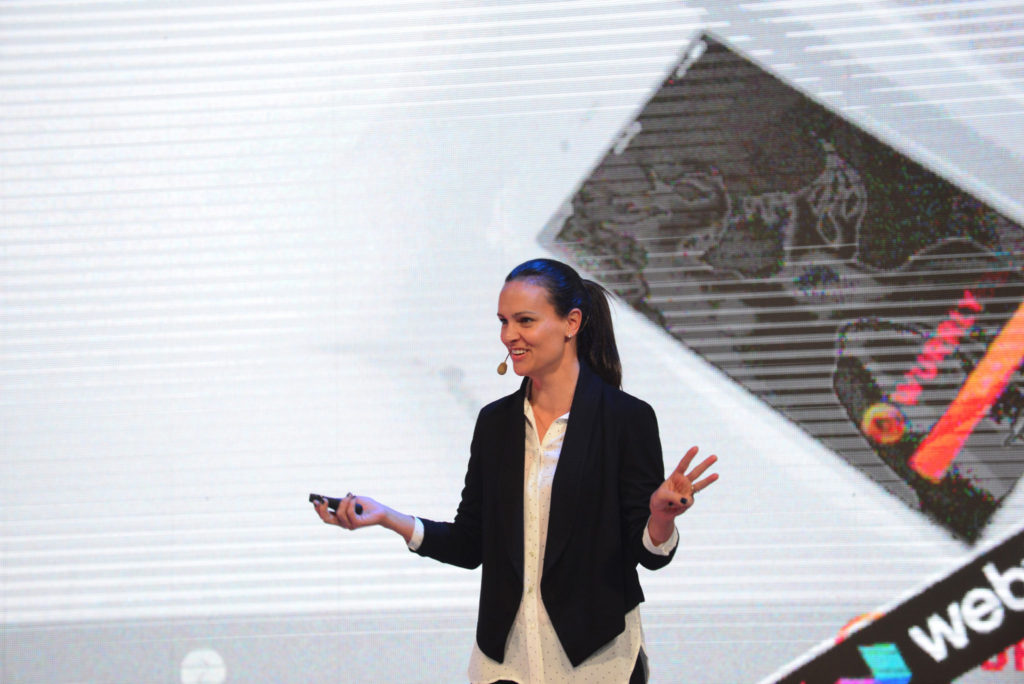 The CEO of Wurrly Nadine Levitt[/caption]
According to Nadine Levitt, the benefits of technology do outweigh the risks. The free access to vast amount of information empowers people and gives them the responsibility to be aware of what is happening around them. Mapping and forecasting save both time and money and make everyday life easier. Thanks to technology we can connect with friends and family around the globe and develop a stronger relationship with them. Through Augmented and Virtual Reality we experience places and worlds far from our current location. VR is very powerful - it can give sick children a chance to leave the hospital room and explore, play and have fun.
During her lecture, Nadine Levitt emphasized the importance of the skills she as a parent wants her children to learn at school. Education and technology should provide kids with opportunities to develop communication, collaboration, analytical and problem-solving skills.
The CEO of Wurrly Nadine Levitt[/caption]
According to Nadine Levitt, the benefits of technology do outweigh the risks. The free access to vast amount of information empowers people and gives them the responsibility to be aware of what is happening around them. Mapping and forecasting save both time and money and make everyday life easier. Thanks to technology we can connect with friends and family around the globe and develop a stronger relationship with them. Through Augmented and Virtual Reality we experience places and worlds far from our current location. VR is very powerful - it can give sick children a chance to leave the hospital room and explore, play and have fun.
During her lecture, Nadine Levitt emphasized the importance of the skills she as a parent wants her children to learn at school. Education and technology should provide kids with opportunities to develop communication, collaboration, analytical and problem-solving skills.
 The CEO of Wurrly Nadine Levitt[/caption]
According to Nadine Levitt, the benefits of technology do outweigh the risks. The free access to vast amount of information empowers people and gives them the responsibility to be aware of what is happening around them. Mapping and forecasting save both time and money and make everyday life easier. Thanks to technology we can connect with friends and family around the globe and develop a stronger relationship with them. Through Augmented and Virtual Reality we experience places and worlds far from our current location. VR is very powerful - it can give sick children a chance to leave the hospital room and explore, play and have fun.
During her lecture, Nadine Levitt emphasized the importance of the skills she as a parent wants her children to learn at school. Education and technology should provide kids with opportunities to develop communication, collaboration, analytical and problem-solving skills.
The CEO of Wurrly Nadine Levitt[/caption]
According to Nadine Levitt, the benefits of technology do outweigh the risks. The free access to vast amount of information empowers people and gives them the responsibility to be aware of what is happening around them. Mapping and forecasting save both time and money and make everyday life easier. Thanks to technology we can connect with friends and family around the globe and develop a stronger relationship with them. Through Augmented and Virtual Reality we experience places and worlds far from our current location. VR is very powerful - it can give sick children a chance to leave the hospital room and explore, play and have fun.
During her lecture, Nadine Levitt emphasized the importance of the skills she as a parent wants her children to learn at school. Education and technology should provide kids with opportunities to develop communication, collaboration, analytical and problem-solving skills.
“I want my children to be best equipped to be entrepreneurs, to be freethinkers.”, Levitt said.She believes the best way to learn is through experience followed by a reflection on that experience. Only when emotion is added to the experiential learning, it enters the long-term memory. Following this formula, WURRLYedu couples experiential learning with music which carries so many different emotions. Music is one of the few subjects left at school which are truly collaborative. It fosters empathy, engages students and develops creative thinking, analytical, problem-solving, management and collaborative skills. The combination between music and technology in education can work if the technology is easy to use and there is a compelling content which children find relevant. WURRLYedu engages students with meaningful content. The comprehensive song library gives them freedom to choose among different styles of music. The platform enables children to change a song, to play with it and customize it to their own taste. Kids have the opportunity to develop collaborative skills while songwriting or performing together. Tips from Grammy awards winning artists are integrated in the lesson plans to make them more relevant to children. As far as teachers are concerned, the platform enables them to create a music curriculum which engages students and fosters communication. Teachers can organize a classroom, send and grade papers and keep a history for each of the students. You can watch her full lecture here: If you want to keep up with the latest trends in the world of digital economy and technology, then Webit.Festival is the right place for you. Visit our website and book 2 in 1 of our Super Earlybird tickets for Webit.Festival Europe 2018. Feel the Webit vibe with some of the best photos from this year’s event! [easingslider id="4954"]
How to fix our education systems for the AI age
We are all talking about the Fourth industrial revolution and its potential toll on the labour market around the world. As the developments of robots, AI and automation seem inevitable, countries, communities and organizations must find ways to adapt our skills to the needs of the future.
During Webit.Festival Europe we had the chance to listen to one of the people that are going to drive this existential change in the processes of learning. The Director of Strategic and International Development at Wolfram Research Conrad Wolfram shared his thoughts on fixing the education for the AI age and took us on a journey through the challenges education faces today.
Wolfram technology and consulting solutions drives innovation in data analytics, software development and modelling from startups to Fortune 500 companies, in industries as diverse as medicine, finance and telecoms.
Conrad is also recognized as a world authority on fixing Math education, including advocating a fundamental shift to focus on computer-based computational thinking rather than hand calculation.
During his speech, he outlined the main effects computers and AI have on education. The first one is that we need to learn subjects that have changed, because the computers now do work that usually humans used to have to do. The second is that AI gives us the tools for building a more personalized learning, assessment and experience during the learning process.
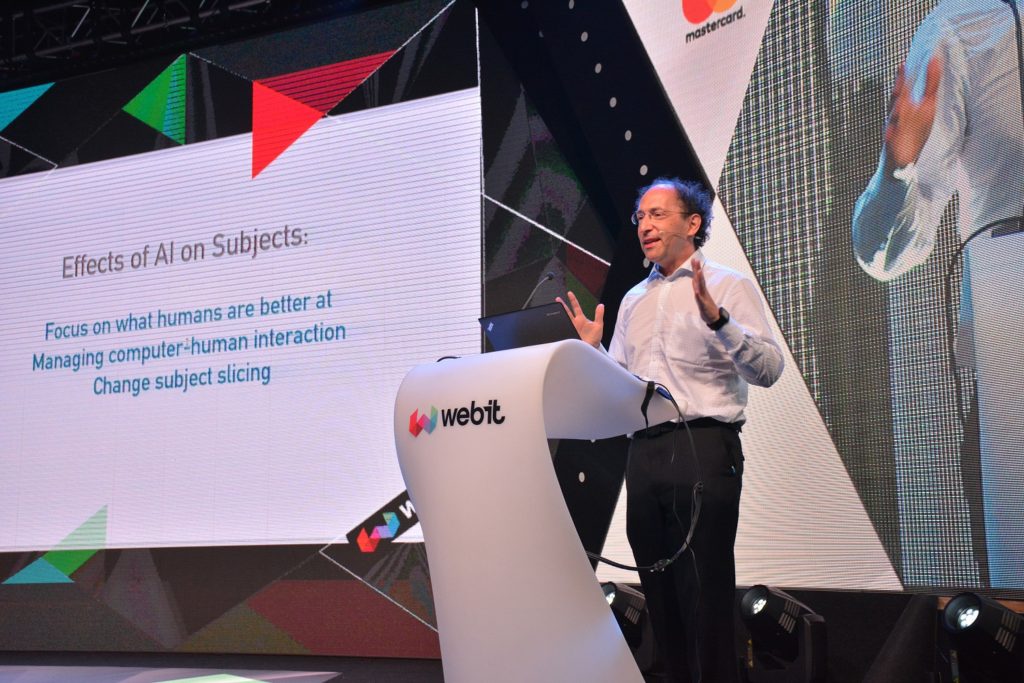 The Director of Strategic and International Development at Wolfram Research Conrad Wolfram.[/caption]
There are at least 3 good reasons for learning the right kind of Math. The first is that it gives us skills for the technical jobs that have powered our economies and continue to do so. The second is that it creates our everyday ability to work in the modern society and deal with the reask that are displayed to us. And the third is that it creates logical thinking about the ways we approach life.
If we talk about the actual essence of Math, we must say that it is a four-step process. You define a question, you translate it to to this abstract notation and the reason you do that is that you can then compute answers much better than you can by talking about it in a normal language, like English or Bulgarian. Then you interpret the results. You take that abstract answer and you go back trying to produce the actual answer to the real question you asked.
The Director of Strategic and International Development at Wolfram Research Conrad Wolfram.[/caption]
There are at least 3 good reasons for learning the right kind of Math. The first is that it gives us skills for the technical jobs that have powered our economies and continue to do so. The second is that it creates our everyday ability to work in the modern society and deal with the reask that are displayed to us. And the third is that it creates logical thinking about the ways we approach life.
If we talk about the actual essence of Math, we must say that it is a four-step process. You define a question, you translate it to to this abstract notation and the reason you do that is that you can then compute answers much better than you can by talking about it in a normal language, like English or Bulgarian. Then you interpret the results. You take that abstract answer and you go back trying to produce the actual answer to the real question you asked.
“The key point to understand is that we need humans to focus on what they are good at and leave computers do the same. And that involves also humans learning how to connect with computers in a meaningful way, so that we have the best interface to get the computers do what we want”, Wolfram said.He gave the example with the ever changing survival skills during the years. Hundreds of years ago it was crucial to be able to make a fire or to kill an animal to eat. There are now different and very modern survival skills to do with computational knowledge. According to him the skill at the top of the future value chain is what we may call computational thinking - knowing how to think in a computational way about life. Around the world we spend many hours of child’s life every week learning Math. But Wolfram thinks that the big question we must ask ourselves is whether this Math is fostering computational thinking, or not? He thinks that right now this is not the wrong subject and we should use all those hours to do much more computational thinking oriented subjects. [caption id="attachment_5052" align="aligncenter" width="640"]
 The Director of Strategic and International Development at Wolfram Research Conrad Wolfram.[/caption]
There are at least 3 good reasons for learning the right kind of Math. The first is that it gives us skills for the technical jobs that have powered our economies and continue to do so. The second is that it creates our everyday ability to work in the modern society and deal with the reask that are displayed to us. And the third is that it creates logical thinking about the ways we approach life.
If we talk about the actual essence of Math, we must say that it is a four-step process. You define a question, you translate it to to this abstract notation and the reason you do that is that you can then compute answers much better than you can by talking about it in a normal language, like English or Bulgarian. Then you interpret the results. You take that abstract answer and you go back trying to produce the actual answer to the real question you asked.
The Director of Strategic and International Development at Wolfram Research Conrad Wolfram.[/caption]
There are at least 3 good reasons for learning the right kind of Math. The first is that it gives us skills for the technical jobs that have powered our economies and continue to do so. The second is that it creates our everyday ability to work in the modern society and deal with the reask that are displayed to us. And the third is that it creates logical thinking about the ways we approach life.
If we talk about the actual essence of Math, we must say that it is a four-step process. You define a question, you translate it to to this abstract notation and the reason you do that is that you can then compute answers much better than you can by talking about it in a normal language, like English or Bulgarian. Then you interpret the results. You take that abstract answer and you go back trying to produce the actual answer to the real question you asked.
“Here is what is going wrong in education. We spend almost all our time learning how to do step 3 by hand. This is the step that computers can do fantastically better than any humans. So what we all should be doing is use computers for step 3 much more and using students much more for steps 1, 2 and 4”, Wolfram said.In school students learn how to solve a linear equation by hand, but in real life the equations we face are much harder and complex. Now our smartphones are able to solve linear equations after a voice command from us. So the key question is why are we spending 10 years of our students lives trying to get them to solve such tasks. Conrad Wolfram founded the computerbasedmath.org to drive implementation of the change. It is now a worldwide force in re-engineering the curriculum with early projects in Estonia, Ireland, Sweden and Africa. The main idea behind the project is that the computer already exist, we have it and it is not going away. And the main task is to figure out how the curriculum should look like. For years we had countries trying to be part of the knowledge economy as opposed to manual labour. The next step is an economy that is driven not only by knowledge, but by the interaction of humans and computation. According to Conrad Wolfram, without a fundamental reform of our education, we are not ready for that. So governments and organizations need to think about innovative ways to unstick the education ecosystem, so that we can have real innovations and not just have to stick with the same things.
“I am avoiding the term Math for much of what I’m now talking, because I think that Math has become a rather toxic word. I like the term computational thinking, but whatever it is called we have to reform what we are doing, either by making a new subjects or by doing a hostile takeover of the old subjects. And it is vital to make that as quickly as possible. Once you got automation in life from machines you need to use it so that humans can go further. We don’t have to make humans compete with the machines, because we will fail”, he said.You may watch Conrad Wolfram’s full lecture here: If you want to keep up with the latest trend in the world of digital economy and technology, then Webit.Festival is the right place for you. Visit our website and book 2 of our Super Earlybird tickets for Webit.Festival Europe 2018 for just €100. Feel the Webit vibe with some of the best photos from this year’s event! [easingslider id="4954"]
Technology will give us the tools to disrupt the dogma in...
We are living in amazing times, often described as the Fourth industrial revolution. Right now it is an incredible time to be involved in technology with its major impact and ability to empower people going forward into the future.
There are many aspects of our everyday life that are going to change dramatically due to the effect of the new technological advances, but healthcare is probably the field, that is going to be transformed the most.
The reason for that is that right now the healthcare systems around the world are inefficient, bureaucratic and expensive. This is a multitrillion-dollar industry which will be disrupted by thousands of startup companies, along with giants like Google, IBM, Apple, Samsung and dozens of others.
At Webit.Festival Europe our guests had the chance to listen to one of the innovators of this incredibly important field for the humanity and the first surgeon, who streamed live operation using Google Glass to 14 000 students across 132 countries - the Co-founder of Virtual Medics & Medical Realities Prof. Shafi Ahmed. During his opening keynote he spoke about the future of the surgical education around the globe and the best ways to disrupt a conservative industry, like healthcare.
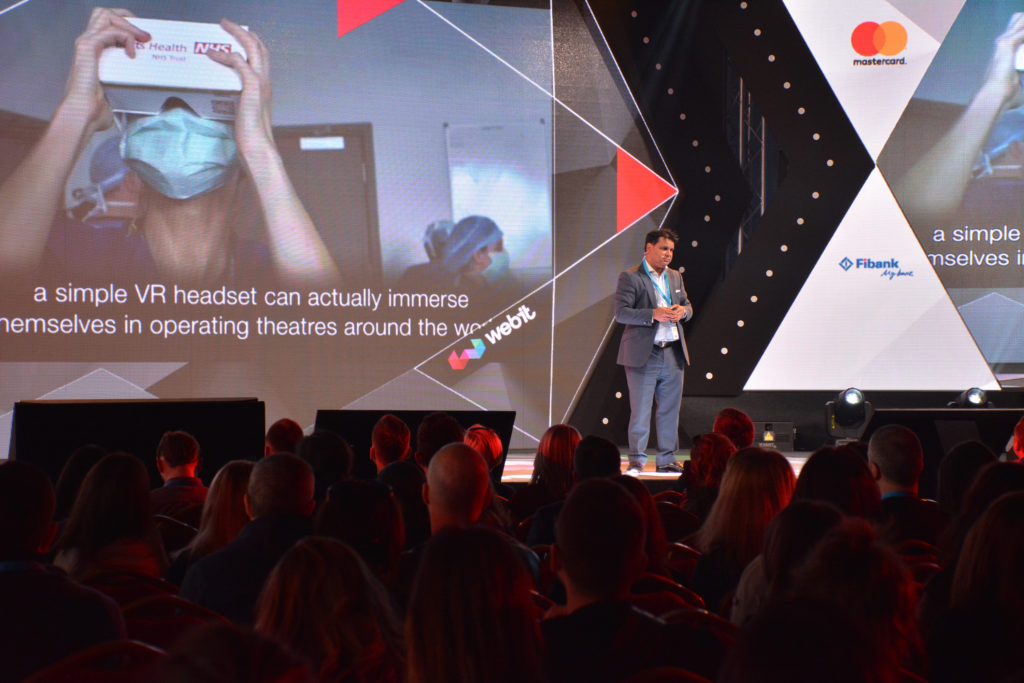 The Co-founder of Virtual Medics & Medical Realities Prof. Shafi Ahmed.[/caption]
In the new digital reality we need access to health services immediately and not waiting for appointments and the new technologies give us the tools to achieve that via Virtual and Augmented Reality and even commonly used software, such as Skype. Suddenly this is disrupting the pure doctor-patient relationship that we have all accepted for being the best.
And there is a lot more to come in the next few years. With avatars and facial recognition technology doctors can transport themselves in VR to other parts of the world and connect to patients there.
The Co-founder of Virtual Medics & Medical Realities Prof. Shafi Ahmed.[/caption]
In the new digital reality we need access to health services immediately and not waiting for appointments and the new technologies give us the tools to achieve that via Virtual and Augmented Reality and even commonly used software, such as Skype. Suddenly this is disrupting the pure doctor-patient relationship that we have all accepted for being the best.
And there is a lot more to come in the next few years. With avatars and facial recognition technology doctors can transport themselves in VR to other parts of the world and connect to patients there.
“Clinical practices are full of dogma and tradition but they want to change. I’m impressed by Bulgaria. You had amazing people here to begin with and all of this happening at Webit is quite a good enabler to think about how to change the world we live in. So please think about disrupting your minds and moving on to a world of exponential medicine”, he told the guests in the packed Blue hall.The famous surgeon is sure that we are approaching the age of singularity - a point at which the machines and computers will become better doctors and surgeons than humans. According to him the best way to facilitate this process is to stop being obsessed with the human touch and the human flavour of clinical practice. The reason for this is that we often visit a doctor for minor problems, like a cough or even a repeat prescription, that we can easily solve online. [caption id="attachment_4960" align="aligncenter" width="640"]
 The Co-founder of Virtual Medics & Medical Realities Prof. Shafi Ahmed.[/caption]
In the new digital reality we need access to health services immediately and not waiting for appointments and the new technologies give us the tools to achieve that via Virtual and Augmented Reality and even commonly used software, such as Skype. Suddenly this is disrupting the pure doctor-patient relationship that we have all accepted for being the best.
And there is a lot more to come in the next few years. With avatars and facial recognition technology doctors can transport themselves in VR to other parts of the world and connect to patients there.
The Co-founder of Virtual Medics & Medical Realities Prof. Shafi Ahmed.[/caption]
In the new digital reality we need access to health services immediately and not waiting for appointments and the new technologies give us the tools to achieve that via Virtual and Augmented Reality and even commonly used software, such as Skype. Suddenly this is disrupting the pure doctor-patient relationship that we have all accepted for being the best.
And there is a lot more to come in the next few years. With avatars and facial recognition technology doctors can transport themselves in VR to other parts of the world and connect to patients there.
“They call me a virtual surgeon, but I think we will be a lot more virtual in the future. We are now producing software technology that enable holoportation - visual transportation in VR. Imagine that you need some advice and a person from other parts of the world are transporting themselves to your operating theatre to help you”, Prof. Ahmed said.He thinks that democratizing the medical education is crucial for our future because today more than 5 billion people across the world don’t have access to safe surgery and this costs millions of lives every year. In Barts Medical School, where Shafi Ahmed is an Associate Dean, students are taught to use technology in different ways than the doctors working today. Part of this new agenda is the Barts X Medicine course where students can learn from venture capitalists, entrepreneurs, designers, developers, coders and people from the Silicon Valley. The school is organizing an annual hackaton and the team that wins receive crowdsourced funding for 3 months to create something substantial for patients care. This is a real disruption of education because in the near future we will need creative doctors, who can enable people, create designs, have innovative ideas and know the path from idea to its fruition. Prof. Ahmed pointed out Big Data, Genome Sequencing, AI and 3D Printing as the technologies that are going to bring the biggest changes in healthcare in the years to come. Meanwhile, the development of robotics will lead to automation of diagnostics and surgical procedures and in the long-term to replacing doctors with machines. You may watch Prof. Shafi Ahmed’s full lecture here: If you want to keep up with the latest trend in the world of digital economy and technology, then Webit.Festival is the right place for you. Visit our website and book 2 of our Super Earlybird tickets for Webit.Festival Europe 2018 for just €100. Feel the Webit vibe with some of the best photos from this year’s event! [easingslider id="4954"]
Webit.Festival will present to you the digital future of education
Technology is rapidly changing the world around us. Many teachers worry that as computers take over most of our daily tasks, there will be no students to teach anymore. But the reality is that education will never disappear, it will just take new forms and will give us the tools we need, so that we can be successful in the society of the future.
Experts predict that one of the main changes to come is the increase in diversity of learning opportunities at different times in different places. This means that in the near future our children will learn the theoretical part of their curriculum outside the classroom, while the practical part will be taught face to face.
This year, Webit.Festival Europe will gather in Sofia Tech Park more than 300 speakers from every corner of the world. Within two days (25th and 26th of April) they will share invaluable experience from the largest enterprises in the digital industry and will explain to more than 5000 attendees from 90+ countries the key factors that will shape our future.
The main theme of the event is re:Inventing Europe’s Future, and what better way to do it, than through quality education and developing the right skill sets for the labour need of tomorrow’s enterprises.
During the Innovation in Education track of the IoE Summit you will get the chance to listen to the Director of Strategic and International Development at Wolfram Research Conrad Wolfram, who will explain how the importance of quantitative understanding for jobs, society and management has exploded over the last few decades. He will also talk about the importance of understanding the changing role of computers and automation of knowledge is crucial.
The CMO of Edulab Norihisa Wada will speak about changing and sustaining learner behavior. Behavior changes are central to all learning conditions. They involve motivating people, increasing their self-efficacy, and altering their intentions, beliefs and desires.
Game mechanics if put to good use are a great way to achieve all these elements. They provide intrinsic motivation, instant feedback and a safe artificial environment to learn. Mr Wada’s presentation will introduce the audience to such “gamify” design and approach trends in learning.
The Opera Singer, Songwriter and CEO of Wurrly Nadine Levitt, will talk about the role technology plays in education, and how such technology can positively impact future learning.
She thinks that educational technology should engage learners and make them participate in and experience the learning processes, just as they no longer consume passively media products.
The CEO of Babbel.com Markus Witte will tell us about the latest trends in languages learning and the changing ways we communicate with each other. In just a few years the market for cloud-based language education has grown into a much-discussed phenomenon and is expected to gross $6 billion by 2021.
Here you can see a full list of the confirmed speakers at Webit.Festival, while here you can get all the information you need about the tickets for the event.
Learn about the crucial elements of future education at Webit.Festival
Over the last few decades, the Information and Communications Technologies (ICTs) have become the modern economy’s greatest driver of innovation, productivity and growth. This industry managed to transform every element of business and society and to enable productivity and innovation in every sector of the economy.
But to realize the full potential of this amazing opportunity, we first have to transform our education systems, so that they can create people with the right skill set to reap the benefits of the digital economy.
This year, Webit.Festival will gather in Sofia Tech Park more than 300 speakers from every corner of the world. Within two days (25th and 26th of April) they will share invaluable experience from the largest enterprises in the digital industry and will explain to more than 5000 attendees from 90+ countries the key factors that will shape our future.
During the IoE Summit you will get the chance to listen to the Director of Strategic and International Development at Wolfram Research Conrad Wolfram, among many others.
The physicist, mathematician, and technologist, is uniquely operating at the intersection of computation, data and knowledge. Wolfram technology and consulting solutions drives innovation in data analytics, software development and modelling from startups to Fortune 500 companies, in industries as diverse as medicine, finance and telecoms.
They include Mathematica software, the Wolfram|Alpha knowledge engine (powering knowledge answers for Apple's Siri), Enterprise Private Cloud and the Wolfram Language.
Conrad is also recognised as a world authority on fixing maths education, including advocating a fundamental shift to focus on computer-based computational thinking rather than hand calculation. He founded computerbasedmath.org (CBM) to drive implementation of the change — now a worldwide force in re-engineering the curriculum with early projects in Estonia, Ireland, Sweden and Africa.Conrad attended Eton College and holds degrees in natural sciences and maths from University of Cambridge.
On Webit’s stage, he will explain how the importance of quantitative understanding for jobs, society and management has exploded over the last few decades. He will also talk about the importance of understanding the changing role of computers and automation of knowledge is crucial.
Conrad Wolfram will address these questions, explaining the fundamental shift needed in education, and describing the major project he's founded to build a dramatically new, problem-centric computational thinking curriculum.
Here you can see a full list of the confirmed speakers at Webit.Festival, while here you can get all the information you need about the tickets for the event.
